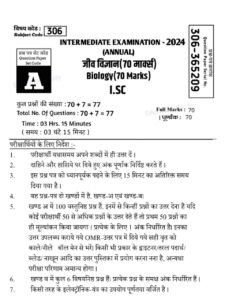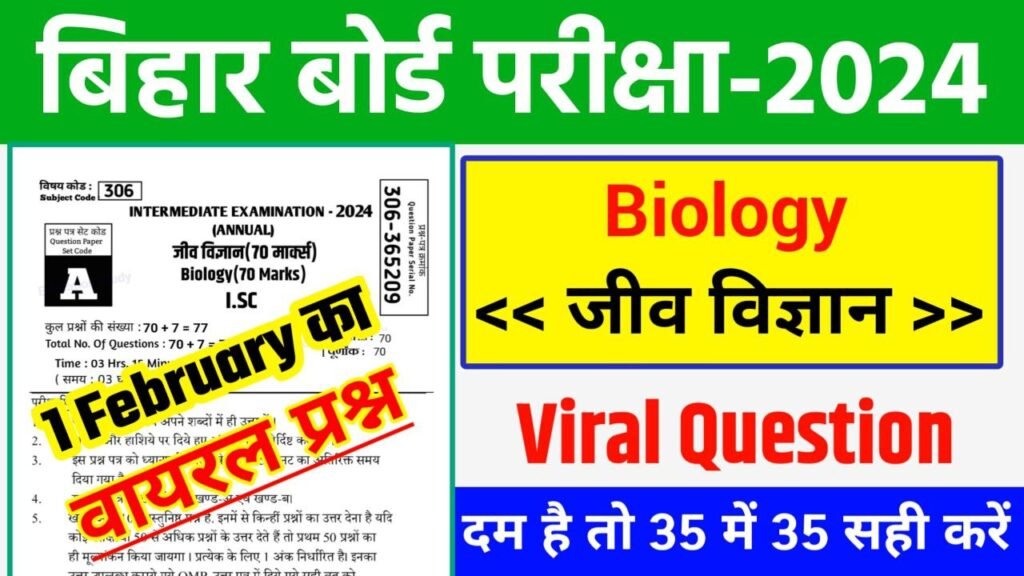Bihar Board 12th Biology Viral Question Exam 2024: यहाँ से जीव विज्ञान का वाइरल question पढ़े… Bihar Center
Bihar Board 12th Biology Viral Question Exam 2024:

- आँकोजीन किसके लिए उत्तरदायी है?
(A) कैंसर (B) एड्स
(C) क्षय-रोग (D) पोलियो
- What is the oncogene responsible for?
(A) Cancer (B) AIDS
(C) Tuberculosis (D) Polio
Answer:- A
- इनमें से किनके द्वारा डेंगू का विस्तारण होता है –
(A) सी सी मक्खी (B) मच्छर
(C) प्रदूषित वायु (D) इनमें से कोई नहीं
- By which of the following dengue is spread?
(A) Ccc, flies (B) Mosquitoes
(C) Polluted air (D) None of these
Answer:-B
- यीस्ट में प्रजनन मुख्यतः किसके माध्यम से होता है?
(A) मुकुलन (B) विखंडीकरण
(C) परागण (D) इन सभी के द्वारा
- Reproduction in yeast mainly occurs through:
(A) Fragmentation (B) Fragmentation
(C) Pollination (D) By all of them
Answer:-A
- दही एवं पनीर उत्पाद है –
(A) किण्वन के (B) पाश्चुराइजेशन के
(C) निर्जलीकरण के (D) इनमें से कोई नहीं
- Yogurt and cheese products are:
(A) Fermentation (B) Pasteurization
(C) Dehydration (D) None of these
Answer:-A
- एगारोज किससे प्राप्त किया जाता है?
(A) समुद्री घास (B) मक्का
(D) इनमें से कोई नहीं (C) साईकस
- From which is agarose obtained?
(A) Seagrass (B) Maize
(D) None of these (C) Cycus
Answer:-A
- मानव मादा में गर्भकाल है –
(A) 30 दिन (B) 90 दिन
(C) 9 माह (D) 7 माह
- The gestation period in human females is –
(A) 30 days (B) 90 days
(C) 9 months (D) 7 months
Answer:-C
- मानव में निषेचन होता है –
(A) गर्भाशय में (B) योनि में
(C) अंडाशय में (D) फैलोपियन नलिका में
- Fertilization occurs in human beings
(A) In utero (B) In vagina
(C) In the ovaries (D) In the fallopian duct
Answer:-D
- गर्भाशय में कॉपर-टी के एक प्रभावी एवं अंत: गर्भाशयी युक्ति होनेका मुख्य कारण है।
(A) शुक्राणुओं की निषेचन क्षमता में कमी
(B) गर्भाशय में कॉपर आयन मोचित होने के कारण शुक्राणुओं की भक्षकाणु क्रिया में वृद्धि
(C) शुक्राणुओं की गतिशीलता में कमी (D) इनमें से सभी
- The main reason for copper-T being an effective and intrauterine device in the uterus.
(A) Decrease in fertilization capacity of sperms
(B) Increased feeding activity of sperms due to release of copper ion in uterus
(C) Decrease in sperm motility (D) All of these
Answer:-D
- मानव जनसंख्या वृद्धि को नियंत्रित करने के लिए चिकित्सीय विधिद्वारा वृषणों का हटाया जाना कहलाता है।
(A) बंध्याकरण (B) ट्यूबेक्टोमी
(C) लेप्रोस्कोपी (D) बासेक्टोमी
- The removal of testes by medical method to control human population growth is called
(A) Sterilization (B) Tubectomy
(C) Laparoscopy (D) Basectomy
Answer:-A
- एक संकरण क्रॉस का फीनोटिपिक अनुपात क्या है?
(A) 1 : 2 : 1 (B) 3:1
(C) 9: 3:3 : 1 (D) इनमें से कोई नहीं
- What is the phenotypic ratio of a hybridization cross?
(A) 1 : 2 : 1 (B) 3:1
(C) 9: 3:3 : 1 (D) None of these
Answer:-B
| Join Telegram | JOIN |
- द्विसंकर क्रॉस का फीनोटिपिक अनुपात क्या है?
(A) 1 : 2 : 1 (B) 3 : 1
(C) 9 : 3 : 3 : 1 (D) इनमें से कोई नहीं
- What is the phenotypic ratio of bihybrid cross?
(A) 1 : 2 : 1 (B) 3 : 1
(C) 9 : 3 : 3 : 1 (D) None of these
Answer:-C
- मेंडल ने प्रस्तावित किया था –
(A) सहलग्नता के नियम (B) 10% ऊर्जा के नियम
(C) आनुवंशिकता के नियम (D) इनमें से कोई नहीं
- Mendel proposed –
(A) Laws of attachment (B) Laws of 10% Energy
(C) Laws of heredity (D) None of these
Answer:-C
- मनुष्य में लिंग-निर्धारण होता है।
(A) माँ के पोषण द्वारा (B) पिता की प्रबलता द्वारा
(C) लिंग गुणसूत्रों के विशिष्ट संयोग द्वारा (D) भ्रूण के विशिष्ट पोषण द्वारा
- Sex determination occurs in human beings.
(A) By the nourishment of the mother (B) By the strength of the father
(C) By specific combination of sex chromosomes
(D) By the specific nutrition of the embryo
Answer:-C
- एक जोड़े को दो लड़कियाँ हैं तीसरा संभावित शिशु लड़की होने कीसंभावना होगी-
(A) 100% (B) 50%
(C) 25% (D) 12.5%
- A couple has two girls. The third potential baby would likely be a girl-
(A) 100% (B) 50%
(C) 25% (D) 12.5%
Answer:-B
- रुधिर वर्ग ‘B’ का जीनोटाइप होगा-
(A) BB या AB (B) BB या BO
(C) AB या OO (D) BB या AA
- The genotype of blood class ‘B’ will be-
(A) BB or AB (B) BB or BO
(C) AB or OO (D) BB or AA
Answer:-B
- ओपेरॉन मॉडल क्या प्रदर्शित करता है?
(A) जीन का सिंथेसिस (B) जीन का एक्सप्रेशन
(C) जीन का रेगुलेशन (D) जीन का फंक्शन
- What does the Operon model demonstrate?
(A) Synthesis of genes (B) Expression of genes
(C) Regulation of genes (D) Function of genes
Answer:-C
- B-डी०एन०ए० के एक पूर्ण घुमाव में नाइट्रोजन बेस के कितने पेयर्सहोते हैं?
(A) 5 (B) 10
(C) 15 (D) 20
- How many pairs of nitrogen base are there in a complete rotation of B-DNA?
(A) 5 (B) 10
(C) 15 (D) 20
Answer:-B
- यदि भ्रूणपोष की कोशिकाओं में 24 गुणसूत्र हों, तो युग्मकों में गुणसूत्रोंकी संख्या क्या होगी?
(A) 8 (B) 16
(C) 23 (D) 32
- If embryonic cells have 24 chromosomes, what will be the number of chromosomes in gametes?
(A) 8 (B) 16
(C) 23 (D) 32
Answer:-A
- इनमें से कौन जीवाणु जनित रोग है?
(A) कुष्ठ रोग (B) क्षय रोग
(C) हैजा (D) उपरोक्त सभी
- Which of the following is a bacterial disease?
(A) Leprosy (B) Tuberculosis
(C) Cholera (D) All of the above
Answer:-D
सभी स्टूडेंट जल्दी से WhatsApp Group मे जुर जाओ लिंक यहाँ है 👇👇👇👇
  |
- एण्ट अमीबा इनमें से क्या है?
(A) जीवाणु (B) शैवाल
(C) प्रोटोजोआ (D) कवक
- Which of the following is ant amoeba?
(A) Bacteria (B) Algae
(C) Protozoa (D) Fungi
Answer:-C
- बीजाण्ड विकसित होकर क्या बनाता है?
(A) फल (B) फूल
(C) बीज (D) बीजपत्र
- What does the ovule grow to form?
(A) Fruits (B) Flowers
(C) Seed (D) Seed
Answer:-C
- किस फल का बीजचोल खाया जाता है?
(A) जायफल (B) लीची
(C) शरीफा (D) उपर्युक्त सभी
- Which fruit is eaten as a seed?
(A) Nutmeg (B) Litchi
(C) Sharif (D) All of the above
Answer:-B
- युग्मनज क्या है?
(A) अगुणित (B) द्विगुणित
(C) त्रिगुणित (D) इनमें से कोई नहीं
- What is Zygote?
(A) Haploid (B) Diploid
(C) Triple (D) None of these
Answer:-B
- हवा के द्वारा परागित होने वाले फलों को कहते हैं –
(A) कीट परागित (B) वायु परागित
(C) हवा परागित (D) इनमें से कोई नहीं
- The fruits pollinated by air are called:
(A) Insect pollinated (B) Air pollinated
(C) Air pollinated (D) None of these
Answer:-B
- स्तनधारी के शुक्राणु के मध्य भाग में क्या पाया जाता है?
(A) केन्द्रक (B) सेंट्रिओल
(C) माइटोकॉण्ड्रिया (D) एक्सोनियम
- What is found in the central part of the sperm of a mammal?
(A) Nucleus (B) Centriole
(C) Mitochondria (D) Axonium
Answer:-C
- Eco RI इंजाइम का स्रोत है
(A) Bam HI (B) E. Coli
(C) ‘A’ और ‘B’ दोनों (D) Hind II
- Eco is the source of RI enzymes.
(A) Bomb (B) E. coli
(C) Both ‘A’ and ‘B’ (D) Hind II
Answer:-B
- सर्वप्रथम क्लीनिकल जीन चिकित्सा का उपयोग किसके लिए कियागया था?
(A) एडिनोसिन डीएमिनेज की कमी (B) चिकेन पॉक्स
(C) डायबिटीज मेलिटस (D) रूमेटॉयड अर्थराइटिस
- What was the first clinical gene therapy used for?
(A) Adenosine deaminase deficiency (B) Chicken pox
(C) Diabetes Mellitus (D) Rheumatoid Arthritis
Answer:-A
- बहुभ्रूणता सामान्यतया इसमें पायी जाती है
(A) केला (B) टमाटर
(C) आलू (D) नींबू
- Polyembryony is commonly found in
(A) Banana (B) Tomato
(C) Potato (D) Lemon
Answer:-D
- इनमें से कौन-सा पौधा जलोभिद है?
(A) सिंघाड़ा (B) नागफनी
(C) शीशम (D) एकेंसिया
- Which of the following plants is aquatic?
(A) Singhara (B) Hawthorn
(C) Shisham (D) Acinacea
Answer:-A
- बढ़ता त्वचा कैंसर एवं उत्परिवर्तन दर की अधिकता किसके कारण है?
(A) अम्ल वर्षा (B) ओजोन परत में कमी
(C) CO प्रदूषण (D) CO2 प्रदूषण
- What is the reason for the increasing skin cancer and mutation rate?
(A) Acid rain (B) Depletion of ozone layer
(C) CO pollution (D) CO2 pollution
Answer:-B
- कीटभक्षी पौधे कीटों को खाते हैं
(A) माँस के लिए (B) ऑक्सीजन के लिए
(C) खनिजों के लिए (D) नाइट्रोजन के लिए
- Insectivorous plants eat insects
(A) For meat (B) For oxygen
(C) For minerals (D) For nitrogen
Answer:-D
- पौधे जो चट्टानों पर उगते हैं, कहलाते हैं .
(A) ऑक्सेलोफाइटं (B) लिथोफाइट
(C) ऐरियोफाइट (D) हेलोफाइट
- Plants that grow on rocks are called
(A) Oxelophyte (B) Lithophyte
(C) Ariophyte (D) Halophyte
Answer:-B
- विश्व में पाये जाने वाले जैव विविधता हाट स्पॉट की संख्या इनमें सेकौन-सी है.
(A) 25 (B) 9
(C) 34 (D) इनमें से कोई नहीं
- Which of the following is the number of biodiversity hot spots found in the world?
(A) 25 (B) 9
(C) 34 (D) None of these
Answer:-C
- रेड डाटा बुक में सम्मिलित है
(A) विलुप्त हो रहे पौधों की सूची (B) दुर्लभ पौधों की सूची
(C) आपत्तिग्रस्त प्राणियों की सूची (D) इनमें से सभी
- Red data is included in the book
(A) List of extinct plants (B) List of rare plants
(C) List of objectionable animals (D) All of them
Answer:-D
- ICBN का पूरा नाम है .
(A) इंडियन काँग्रेस ऑफबायोलॉजिकल नेम्स
(B) इंटरनेशनल कोड ऑफ बोटैनिकल नामेनकल्चर
(C) इंटरनेशनलकांग्रेस ऑफ बायोलॉजिकल नेम्स
(D) इंडियन कोड ऑफ बोटैनिकल नामेनक्लेचर
- The full form of ICBN is.
(A) Indian Congress of Biological Names
(B) International Code of Botanical Nomenclature
(C) International Congress of Biological Names
(D) Indian Code of Botanical
Answer:-B
सभी स्टूडेंट जल्दी से WhatsApp Group मे जुर जाओ लिंक यहाँ है 👇👇👇👇
  |
Bihar Board 12th Biology Viral Question Exam 2024Bihar Board 12th Biology Viral Question Exam 2024Bihar Board 12th Biology Viral Question Exam 2024Bihar Board 12th Biology Viral Question Exam 2024Bihar Board 12th Biology Viral Question Exam 2024Bihar Board 12th Biology Viral Question Exam 2024Bihar Board 12th Biology Viral Question Exam 2024Bihar Board 12th Biology Viral Question Exam 2024Bihar Board 12th Biology Viral Question Exam 2024Bihar Board 12th Biology Viral Question Exam 2024Bihar Board 12th Biology Viral Question Exam 2024Bihar Board 12th Biology Viral Question Exam 2024Bihar Board 12th Biology Viral Question Exam 2024Bihar Board 12th Biology Viral Question Exam 2024

